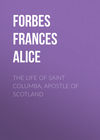Loe raamatut: «The Life of Saint Columba, Apostle of Scotland», lehekülg 4
CHAPTER VI
THE ISLE IN THE WESTERN SEAS
IT must have taken the little band of missionaries, even if the wind were in their favour, fully a day to make the coast of "Calyddon" or "the Land of Forests," as Scotland was then called by the Britons south of the Clyde.
They landed first, we are told, on the island of Oronsay, but on climbing a hill to look out over the waste of waters, Columba caught sight of the far faint coast of Ireland lying like a blue cloud on the horizon. It was more than he could bear, and the mariners put out to sea again, sailing northwards till they reached the little island of Hy or Iona, off the coast of Mull. (Hy or Hii means "the island"; Iona "the blessed island.") The bay where they landed still bears the name of Port'a Curraigh or "the Bay of the Wicker Boat." No trace of the hills of Erin was to be seen from the low-lying rocks of Iona, nothing but the blue mountains and the dark crags of the Hebrides and the white-capped waves of the sea. Here, therefore, the ambassadors of Christ resolved to build their little monastery and to make their home.
It was a happy choice. No better quarters could have been found for a missionary station. Iona, separated only by a narrow channel from the island of Mull, lay exactly opposite to the friendly kingdom of Dalriada, and the missionaries had only to sail up the chain of lochs, now united by artificial means and called the Caledonian Canal, to find themselves in the heathen country of the Picts. The weird and austere beauty of the Hebrides with their wild rocks and foaming seas did not at first appeal to the Gaels of Ireland, fresh from the green hills and smiling landscapes of their native land. The bare crags and the dark mountains, the grey skies and the hollow waves that beat perpetually on those bleak shores,
and bring The eternal note of sadness in,
the wailing of the wind through the caves and the narrow channels fretted into weird shapes by the ocean tide, made a music which was alien to their ears, and strangely melancholy to their warm Irish hearts. Again and again the passionate note of longing for the dear mother-country breaks out in the writings of Columba.
'Twere sweet to sail the white waves that break on the shores of Erin,
'Twere sweet to land 'mid the white foam that laps on the shores of
Erin,
My boat would fly were its prow once tumed to the dear land of Erin,
And the sad heart cease to bleed.
There's a grey eye that ever turns with longing look to Erin,
No more in life again to see the men and maids of Erin.
There's a mist of tears in the melting eye that sadly turns to Erin,
Where the birds' songs are so sweet.
Hy, he calls the "land of ravens"; it was only after many years that he was to sing of the place of his exile as
Hy of my love, Hy of my heart,
dear then as the land of his labours and of his apostolate for Christ, and very close in his affections to the country of his birth.
The poet-heart of Columbcille could sing of his regret for the island of his birth; but he was not the man to let it interfere with his work for God in the island of his adoption. Iona consisted for the most part of barren and desert moor. Columba asked and obtained it as a gift from Conal, King of the Dalriadan Scots, and set his monks at once to cultivate the soil. The huts of the brethren were built in a circle round the church, with a guest-house and a simple refectory adjoining. The building was of wood and wattles, and the work proceeded rapidly. The hut of Columba was in the most elevated spot of the monastic enclosure, and here, during the short intervals between his missionary journeys, he spent his time in prayer, study, and the transcription of the Holy Scriptures. Iona had its writing school for the training of the younger monks, and became famous later for the excellence of its scribes. Adamnan in his Life of St. Columba mentions the scriptorium with its waxen tablets and the styles for writing, the inkhorns and the pens, with the brushes and the colours for illuminating the manuscripts.
In all the labours of the day Columba took his part; no work was too humble for the holy abbot, and he exacted from others the same cheerful diligence as he himself practised. No one was allowed to be idle, there was work enough for all, and each was expected to take his share. When the manual labours were ended for the day, the monks betook themselves to prayer, reading, or writing, while the less expert could always employ themselves in works of charity for the common good. Even while the brethren were engaged in active labour, they strove to occupy their minds with thoughts of God, so that their work might be hallowed by prayer and bring its blessings on their mission. When the toils of the day were at an end they took their rest on their hard pallets of straw; but Columba slept on the bare ground with a stone for pillow, as had been his custom from his earliest years.
The rule of a Celtic community recommended hospitality to guests as strongly as personal austerity, and nowhere was this rule more faithfully observed than at Iona. No sooner were the monks settled in their new home, than pilgrims came from every quarter to ask counsel of Columba or to embrace the religious life under his direction. The holy abbot, who sought in every action of his life to make atonement by true humility for the movement of pride that had cost him so dear, would go himself to meet them. Kneeling before them he would loosen their sandals and wash their feet, which he kissed with reverent devotion; performing for them, in imitation of his Divine Master, this lowliest of services. At every hour of the day or night shouts might be heard across the narrow channel that divided Iona from the island of Mull. At this signal the brethren would leave their work to go down to the shore where, stepping into their "curraghs," they would row across the Sound to fetch the pilgrims.
Some of these were merely moved by a desire to see and speak to the holy man whose fame had already reached their ears. Some were in need of advice, some of material help. Some had a load of sin and sorrow on their souls, and desired the Saint's absolution; some were suffering from diseases, and sought his prayers and blessing; while others wished to leave the world and join the brethren in their life of penance. There was no sorrow to which the loving sympathy of Columbcille did not extend, no necessity which did not appeal to his charity. He dealt with them all in turn, and gave to each according to his need.
It was on one of these occasions that Columba, engaged at the moment in transcribing the Scriptures, foretold sadly that one of the pilgrims who was heard shouting lustily on the seashore, would shortly upset his inkhorn. The visitor, a too enthusiastic admirer, in his eagerness to embrace the Saint, fulfilled the prediction to the letter. Luckily the sleeve of Columba's tunic was the only thing that suffered. He had probably put the precious manuscript in a place of safety.
He was careful with those who desired to embrace the religious life, and would make trial of their vocation with wise severity. He knew well that in those wild days it was no uncommon thing for men who had led evil lives to desire to make atonement for their sins in a monastery. Given that the repentance were sincere, he wholly approved their design, for many of the Saints of the Church have been converted sinners. But he knew also the weakness of human nature and the strength of the evil habits of a lifetime, and demanded that such penitents should go through a long probation and prove their sincerity by humility and obedience to those in charge of them before they were admitted to the religious life.
For these would-be monks he founded communities on some of the neighbouring islands, where wise and saintly men might try their virtue by a probation which lasted sometimes for seven years or even longer when necessary.
On one occasion when Columba was visiting one of these foundations on the island of Himba, he ordered that in honour of his presence, some savoury addition should be made to the frugal midday meal. The brethren gratefully partook of the holiday fare in the spirit in which it was given – with one exception. This was one of the penitents who was undergoing his probation and who seemed to think it more perfect to refuse the proffered dainty. Columba with kindly insistence offered the dish with his own hands to the reluctant brother, and pressed him to partake of it, thinking that some scruple might be distressing him. But he was met with an abrupt refusal. For a moment Columbcille was silent, then looking at the man sternly he said: "You refuse the comfort which I and your superior think it right to offer you. The time will come when you will become a thief again as you were of old, and will steal venison for your own pleasure in the forests of your native place." The prophecy was fulfilled. Not long after, the man returned to his evil life, and died unrepentant in his own country.
In spite of these precautions the community at Iona increased so rapidly that the island soon became too small to hold it, and little bands of devoted men were sent forth to found other monasteries on the mainland, to spread the faith and love of Christ. There are more than ninety churches in Scotland that can trace their foundation to the time of Columba; and each church, according to the custom of the time, had its neighbouring monastery.
The first missionary journey of Columba was to the Scots of Dalriada. They were Christians it is true, but living as they did surrounded on all sides by a heathen population, they were apt to be influenced more or less by the customs of their neighbours. It was necessary that friendly relations should be established with these men, themselves originally of Irish extraction, before attempting the conversion of the Picts. The monks of Iona were hardy mariners as well as tillers of the soil. The holy island had its little fleet of curraghs which varied in size according to the number of ox-hides used in their construction. In these frail barks the missionaries would brave the stormy seas of the Hebrides and all the dangers of the deep, secure in their trust in God and the prayers of their holy abbot. There were sharks, and whales too, on the coasts of Caledonia in those days, and the curraghs were small protection against such monsters; but the hearts of the mariners were stout and their faith was strong. They sailed northwards to far St. Kilda and the Orkney and Shetland Isles, where the ruins are still to be seen of churches which they founded.
The holy abbot would take his turn at the oars with the rest, and when he was not with the missioners on their travels would follow them in spirit from his cell at Iona, shielding and protecting them by his prayers. He knew by the supernatural light that God had given him when they were in danger, and suffered with them in all the hardships they endured. The interests of the last and least of them were as dear to him as his own. Small wonder then that the memory of the holy life lived more than thirteen hundred years ago is fragrant and living still, and that the name of Columba is cherished in the land of his adoption even to the present day.
CHAPTER VII
THE APOSTLE OF SCOTLAND
IN the mountain fastnesses of Caledonia beyond the Grampian Hills, lived a wild and hardy race of men known to their British neighbours as the Picts or "Painted People." The name had originally been bestowed on them by the Romans in allusion to their habit of going into battle with their bodies tattooed all over with strange devices. They were a brave and warlike tribe, who had resisted the landing of Agricola and his legions, and after several pitched battles had driven the Roman eagles triumphantly before them to the sea. In later days they became the terror of the Britons of Strathclyde and Northumbria, descending upon them in wild hordes and raiding their country without mercy. These men were the original ancestors of the Highlanders of Scotland, in whom the courage and the fighting spirit, typical of the race, have survived through all the vicissitudes of their country, and who to this day are acknowledged to be the bravest and hardiest of the soldiers of the Empire.
It was to this people, like himself of Celtic origin, that Columba was to carry the priceless gift of the faith, entering with a handful of unarmed men into the heart of the country which the Roman legions had feared to penetrate. Brude or Bmidh, the Pictish King, was entrenched in his fortress on a rocky hill near the site of Inverness. The little band of missionaries wound their way up the hill, chanting as they went a psalm of confidence in God. At their head was Columba, bearing aloft the cross. The tidings of their approach was brought to the Pictish King, who ordered that the gates of the fortress should be barred against them and admittance refused.
Broichem, the high-priest of the Druids, the foster-father and chief adviser of King Brude, was probably responsible for the order, for, the Christians once admitted, he feared that his influence would be no longer supreme. Columba, however, was not in the least daunted by this inhospitable reception. He made the sign of the Cross before the barred gates and struck them strongly with his clenched fist. Bolts and bars shot back at his touch, and silently the great gates rolled open to give the Saint and his companions passage. The King, who had seen the marvel together with all his Court, was struck with fear, and went to meet Columba with fair and peaceful words. From henceforth he treated him with reverence and courtesy, confirming to him the gift of Iona, which might be considered to lie as much in his territory as in that of the Dalriadan king, and remaining throughout his lifetime a true friend and protector.
It was not until some time later that he became a Christian, but the Druids could foresee the results of his friendly intercourse with the missionaries, and resolved not to lose their influence without a struggle. Their bitter enmity was to follow Columba for years, and to be the chief hindrance to his work amongst the Picts.
The religion of the Druids of Caledonia differed in some degree from that of the Druids of Britain. The people were taught to worship the sun, the rivers and the forests. Certain of the streams and wells which were, said the Druid priests, under the influence of a beneficent spirit, were wholesome and good to drink, while to taste of others which they declared to be under the rule of evil spirits, would be followed by instant death.
The first thing to be done was to convince the people of the falsity of their belief and to make them cease the idolatrous practices connected with it. Columba drank in their presence of the water that was supposed to be deadly, to prove to them that no evil effects would follow. The Druids pursued him wherever he went, interrupting him continually in his preaching, holding him up to the derision of the people, and misrepresenting what he said. Columba bore all their insults with patience; but when it came to trying to drown the missionaries' voices in the singing of the psalms of the Church with shouts and mocking cries, his zeal for God's glory overcame for once his meekness, and he intoned the holy chant in such a voice of thunder that his adversaries were silenced, and the King and his people trembled with fear.
In spite of the Druids, crowds flocked to hear the preaching of Columba, and many were converted to the faith. On one occasion, shortly after the conversion to Christianity of a whole family, the eldest son fell ill and died. The Druids were of course at hand to assure the sorrowing father that the loss of his child was a well-merited punishment indicted by the gods of his country in consequence of his apostasy. The man's faith wavered, but Columba was watching over his converts; and after doing what he could to console the grief of the boy's parents, asked to be left alone beside the bier to pray. With tears and entreaties he besought of God to show forth His almighty power, and the Heavenly Father heard the prayer of His servant and raised the child to life. Columba led him to his parents, and their faith in the true God was confirmed for ever. The prayer of Columbcille, says Adamnan his biographer, was as powerful with God as that of Elias and Eliseus in the old law, and Peter, John, and Paul in the new.
One day when the Saint was preaching the Gospel in the island of Skye, he had one of those flashes of supernatural insight of which we have spoken several times before. He told his companions that there would come to them that very day an old Pictish chief who was at the point of death, and who had tried to lead a good life according to the natural law of God and the light of his own conscience.
It happened as he had foretold. Towards evening a boat was seen approaching the coast of Skye, manned by Pictish warriors supporting in their arms an old man whose trappings proclaimed him to be of noble birth. Drawing their boat to the shore, they landed and formed a rude litter with their shields, on which they carried the old chieftain up the hill and laid him down at Columba's feet. The Saint spoke to the dying man of the faith of Christ and baptized him, and shortly afterwards he gave up his soul to God.
On another occasion when they were crossing the mountains, Columba saw a vision of angels, and exhorted his companions to hasten on their way. "For," said he, "there is a man of good and honest life waiting beyond the hills to receive baptism before he dies." They quickened their pace, and when they reached Glen Urquhart, found, as Columba had predicted, an old man awaiting their arrival. The holy abbot baptized him and bade him depart in peace, and the angels whom he had seen on the mountains carried his soul to heaven.
The chief Druid Broichem had a young Irish slave-girl, taken captive in time of war, for whose freedom Columba had several times petitioned. The Druid, who was not likely to look favourably on any request of the great Christian missionary, even refused to accept the ransom offered for the girl, though she was pining her heart out for her family and her home.
Columbcille warned him that if he persistently refused to show mercy to his captive, the punishment of God would overtake him, and he would die before Columba himself left the country, but Broichem was not to be moved. Not long afterwards Columba set out on his return journey to Iona, but he had hardly reached Loch Ness when he was overtaken by two messengers from the high-priest beseeching him to take pity on their master, who had been suddenly taken ill and was in danger of death.
They were assured that the Druid would recover, but only on condition that he set the Irish maiden at liberty. She was at once sent to Columba, who found means for her return to her country and her people. As for Broichem, he was more incensed than ever against the Christians, and considered how he could best check their growing influence with the people.
The Druids seem to have had a certain power over the elements, perhaps through the evil spirits whom they worshipped. They had heard of and seen the miracles worked by Columba, and resolved to show how superior their powers of magic were to his.
On the day fixed for the departure of the missionaries, Broichem threatened that he would cause a thick fog and a contrary wind to arise, so that it would be impossible for them to embark.
The people were gathered in crowds to bid farewell to Columba, when to their great consternation the Druid's threat was fulfilled. The fog was dense and the unfavourable wind blew stormily. This time at least they had triumphed, or so they thought, and they did not attempt to conceal their joy.
But Columba, nothing daunted, bade the mariners spread their sails, and the awe-stricken crowd on the shore beheld the boat flying swiftly westwards to Iona in the teeth of the contrary wind, as if it had been altogether in their favour.
The departure was not to be for long. Again and again Columba revisited the mainland to strengthen and confirm the faith of his converts; and in course of time churches and monasteries sprang up amongst the forests and the mountains of Caledonia, little strongholds of Christianity the beneficent influence of which was soon to penetrate throughout the length and breadth of the land.














